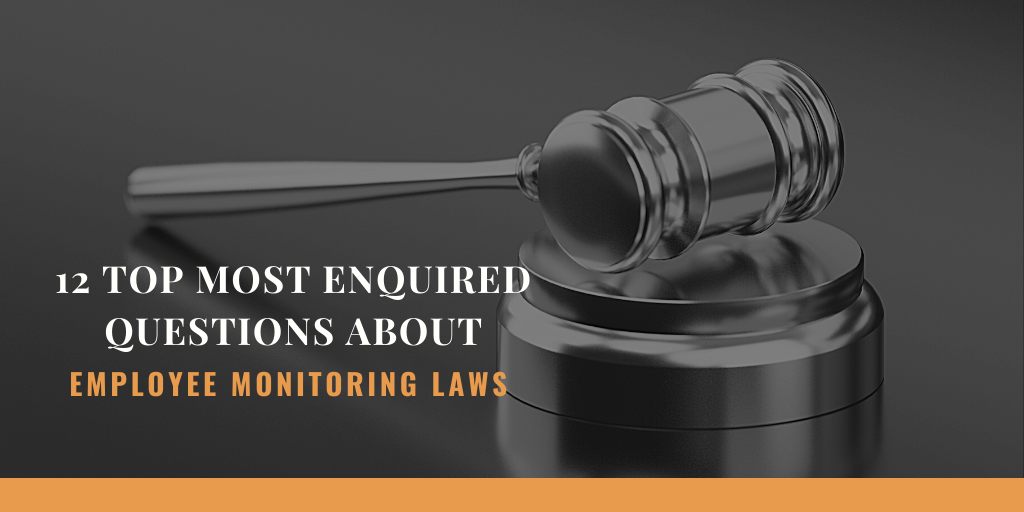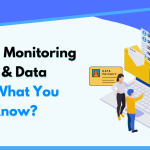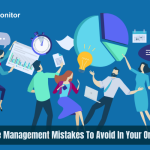-
Is Employee Monitoring Legal?
-
Is it Legal to Monitor Company’s Computers?
-
Is it Legal to Monitor Screen Contents and Keystrokes?
-
Is it Legal to Monitor Employee Internet and Social Media activities?
-
Is it Legal to Use Video monitoring systems in the Workplace?
-
Is it Legal to Monitor or Record Phone Conversations?
-
Is it Legal to Monitor Email Content?
-
Is it Legal to Monitor Private Messages?
-
Is it Legal to Monitor Employees Personal Computers?
-
Is it Legal to Monitor Employees Personal Devices?
-
Is it Required to Inform Employees of the Monitoring?
-
Employee Monitoring Policy – Mandatory or Not?
- Some bonus information Inside.
Hit the PLAY button to listen to this Podcast
Is employee monitoring legal? Have you ever wondered about employee monitoring laws in your country? Is it legal, and if yes, to what extent? Are employee’s permission and consent required to monitor their system? Is it necessary to notify them? Today, we have decided to explore and questions about employee monitoring laws and present them with detailed answers –
In most countries, monitoring of work devices is completely legal. Yet, in some, you need consent, while in others, you can monitor emails but not keystrokes, and so on. The legality of the extent of employee tracking depends on your local, state, or federal laws.
-
Is Employee Monitoring Legal?
Yes, if we see, in most countries, employers have the right to monitor their employees. Some companies have their own laws of getting consent from their employees, and some can even monitor without it. Also, there are zero legal requirements needed by the employers to inform or disclose to their employees that they are under surveillance.
-
Is it Legal to Monitor Company’s Computers?
Yes. The law allows the employer to monitor systems they have ownership of. As per ECPA, If any employer provides a system to their employees, it is company property. An employer has full rights to monitor all the work carried out by employees in it. This includes but not limited to downloads, stored files/documents, idle/active time, and internet usage. Additionally, if any device which is under company’s property is being used outside the office can be duly monitored.
-
Is it Legal to Monitor Screen Contents and Keystrokes?
Yes. In most countries, employers can monitor their employee system’s screenshot and keystrokes typed during office hours. One thing to be noted is – if there is properly documented workplace policy in a company, your employer can access whatever an employee does on their office systems. It is legal.
-
Is it Legal to Monitor Employee Internet and Social Media activities?
Yes. Usually allow employees to surf the internet and use social media for work-related purposes during office hours. But, as we all are aware of the cyberloafing process. The law allows employers to keep track of their employee internet activities like the amount spent online during office hours, websites visited, and also put restrictions on visits to some specific websites. Also, employers are allowed to make social media policies for their respective companies. These policies will restrict employees from indulging in any kind of internet activities that are not allowed during office hours.
-
Is it Legal to Use Video monitoring systems in the Workplace?
Yes. it is completely legal that employers can use video monitoring systems in the workplace. But there should be a valid business reason behind that. Also, it is very important to notify and tell your employees that they are being monitored. Consent is crucial.
-
Is it Legal to Monitor or Record Phone Conversations?
Yes. If the employee is using the office phone, then it is legal. In the 4th amendment, the Electronic communications privacy act(ECPA), 1986 says that it is against the law to intentionally intercept any wire, oral, or electronic communication. However, there are common exceptions:
Service provider exception: The service provider is permitted to access electronic communications.
Business-related exception: Employers are allowed to keep track of the use of office systems but a definite business reason is needed to do it.
Prior-consent exception: Federal law allows the recording of phone conversations with the permission of at least one of the parties (one-party consent law).
-
Is it Legal to Monitor Email Content?
Yes. it is legal that employers can monitor their employees’ email. Any email(private emails or business-related emails) that is received or sent from an office system is the property of the employer and it can be viewed by the company at any point in time.
-
Is it Legal to Monitor Private Messages?
Yes. But there is one exception. Employers can only monitor messages if it has been received or sent on the office equipment or using the employer network. If it was sent on a personal device, employers may, in this case, monitor it if there is a policy in place (refer to the section “Is it Legal to Monitor Employees Personal Device”).
-
Is it Legal to Monitor Employees Personal Computers?
Yes. Under certain circumstances, an employer can gather data on a computer that belongs to an employee through court order or a well-defined employment policy that requires surveillance on an employee’s computer in office premises.
-
Is it Legal to Monitor Employees Personal Devices?
Yes. The law forbids workers from tracking personal devices (laptops, phones, ipads). The legislation allows surveillance as long as there are policies such as (BYOD) Carry Your Own Computer policies in favor of tracking the usage of employee personal devices for work-related purposes.
-
Is it Required to Inform Employees of the Monitoring?
Yes. It is very important and necessary that you should notify your employees about the monitoring software system beforehand. In some countries and states, it is legal that employers can monitor their employees without having their consent.
-
Employee Monitoring Policy – Mandatory or Not?
Yes. It is proposed that all employee monitoring procedures in the workplace: be specifically described, documented, and reported properly.
- Explain in detail what and how you will monitor.
- Require a formal and written acknowledgment from the office workers.
- Make sure to state your employees that apart from the work performance data nothing else will be gathered.
- Clarify that there is little or no expectation of privacy when using company property.
- Set restrictions on the disclosure of personal data to third parties.
To Start Tracking Your Remote Employees Legally, Click Here
Lawyers’ Advice on Monitoring
Yes. Lawyers usually counsel companies to pursue a responsible path to monitoring workers. When contemplating tracking and gathering employee records, employees will take into consideration that the gathered information has a legitimate purpose for the enterprise. In cases where approval is provided by statute, managers ought to be clear to the workers about the following; what is being tracked, when and how the workplace tracking program should function. The organization will also take appropriate protective steps to safeguard gathered employee details.
Bonus Information!
Employee Monitoring Laws (Simplified)
Video monitoring systems – Employers have given permission to install video monitoring software at work systems but areas such as locker rooms, restrooms, and changing rooms. Also, it is very important that employers should tell their employees about the monitoring structure.
Company devices – Employers have full rights to control and monitor the devices owned by the company and also have a legitimate reason to do it.
Phone/Email monitoring – Before recording or monitoring conversations, the consent of employees is greatly needed. Without consent, employers cannot do that.
Employee Handbook – Every employer should get an employee handbook created in which all the recommended and mandatory policies will be explained. This handbook should explain to the employees what they are allowed to do in the office premises and what not. As per the changes in the policies and employment laws, Employers must update from time to time.
Don’t Forget To Check Out Our Latest Posts –
How Can You Make Sure Your Remote Team Meets Deadlines? Here Are 7 Tips











